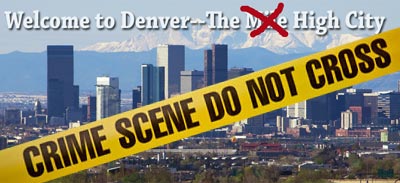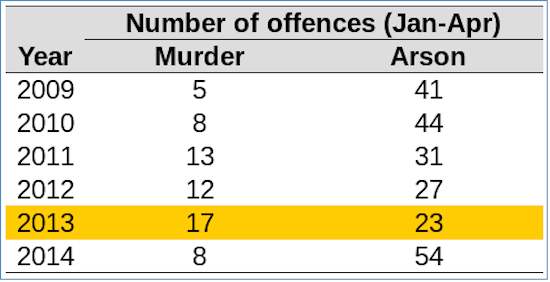By Sierra Rayne ——Bio and Archives--June 4, 2014
Guns-Crime-Terror-Security | CFP Comments | Reader Friendly | Subscribe | Email Us

 Denver had an unusually high number of murders in 2013, and an unusually low number of arsons. Consequently, we shouldn't get too excited about the drop in murders from 2013 to 2014, nor about the increase in arsons during this timeframe, especially if we want to look at the potential impacts of marijuana legalization.
Similarly, while the number of aggravated assaults did decline very slightly (by 3.7 percent) during the first four months of 2014 compared to 2013, the number of these offenses so far in 2014 (712) is higher than it was for the same length of time in 2011 (696), 2010 (593), and 2009 (705). One would generally say there has been no clear trend since 2009 for these crimes, and that any year-over-year changes between 2013 and 2014 are just random variations rather than the influence of marijuana legalization.
Taube goes on to claim that "a 2013 Gallup poll named Denver the second-safest-feeling city in the United States. The reason people feel safe in a particular city is owing to its reputation for safety. Ergo, Denver's crime levels are unlikely to rapidly increase or decrease." Perhaps residents in Denver do indeed feel like the "second-safest-feeling city in the United States," but they shouldn't.
If you search the FBI's Uniform Crime Reporting Statistics of Large Local Agencies database for violent crime rates by city, Denver ranks 105th highest out of 285 cities during 2012 (the latest year with available data). So Denver ranks almost in the top one-third of cities with the highest violent crime rates in the USA. Denver's murder rate in 2012 ranked 113th out of 287 cities, once again nearly in the top third. For property crimes, Denver's 2012 rate ranked 135th highest out of 285 -- or in the top 50th percentile. Denver is most certainly not one of the safest cities in the United States, regardless of how its residents feel.
What we do know is that the overall number of crimes in Denver has increased since pot legalization came into force in 2014 when compared to the same period from the year before. We also know that much of the crime increase occurred during May/June 2013 after the Colorado legislature passed bills regulating the manufacture, sale, distribution, and use of recreational marijuana and the governor subsequently signed the bills into law -- rather than taking place on January 1, 2014 when the first stores in the state to sell pot for recreational use opened.
Denver had an unusually high number of murders in 2013, and an unusually low number of arsons. Consequently, we shouldn't get too excited about the drop in murders from 2013 to 2014, nor about the increase in arsons during this timeframe, especially if we want to look at the potential impacts of marijuana legalization.
Similarly, while the number of aggravated assaults did decline very slightly (by 3.7 percent) during the first four months of 2014 compared to 2013, the number of these offenses so far in 2014 (712) is higher than it was for the same length of time in 2011 (696), 2010 (593), and 2009 (705). One would generally say there has been no clear trend since 2009 for these crimes, and that any year-over-year changes between 2013 and 2014 are just random variations rather than the influence of marijuana legalization.
Taube goes on to claim that "a 2013 Gallup poll named Denver the second-safest-feeling city in the United States. The reason people feel safe in a particular city is owing to its reputation for safety. Ergo, Denver's crime levels are unlikely to rapidly increase or decrease." Perhaps residents in Denver do indeed feel like the "second-safest-feeling city in the United States," but they shouldn't.
If you search the FBI's Uniform Crime Reporting Statistics of Large Local Agencies database for violent crime rates by city, Denver ranks 105th highest out of 285 cities during 2012 (the latest year with available data). So Denver ranks almost in the top one-third of cities with the highest violent crime rates in the USA. Denver's murder rate in 2012 ranked 113th out of 287 cities, once again nearly in the top third. For property crimes, Denver's 2012 rate ranked 135th highest out of 285 -- or in the top 50th percentile. Denver is most certainly not one of the safest cities in the United States, regardless of how its residents feel.
What we do know is that the overall number of crimes in Denver has increased since pot legalization came into force in 2014 when compared to the same period from the year before. We also know that much of the crime increase occurred during May/June 2013 after the Colorado legislature passed bills regulating the manufacture, sale, distribution, and use of recreational marijuana and the governor subsequently signed the bills into law -- rather than taking place on January 1, 2014 when the first stores in the state to sell pot for recreational use opened.View Comments
Sierra Rayne holds a Ph.D. in Chemistry and writes regularly on environment, energy, and national security topics. He can be found on Twitter at @srayne_ca